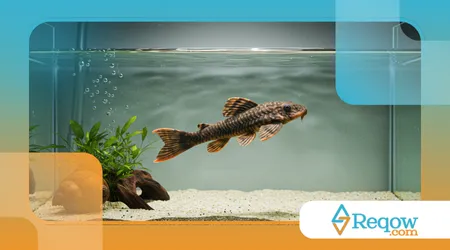Fish That Can Be Raised Without Filters and Oxygenation: What Are They and How to Care for Them?

Understand what the fish that can be raised without filter and oxygenation is the first step to ensuring a healthy aquarium, even with few resources.
Advertisements
Creating an aquarium at home is a fascinating experience, but not everyone has the infrastructure to install filters or oxygenation systems.
This doesn't mean caring for fish is impossible. Some species adapt very well to simpler environments, as long as they receive adequate attention.
Many people who live in small apartments or have busy schedules prefer minimalist aquariums. A glass container with clean water and basic decor may seem sufficient, but without the right knowledge, fish can suffer.
The good news is that some species are naturally designed to live in environments with little water movement, low oxygenation, and even in confined spaces.
Advertisements
This doesn't eliminate the responsibility of care, but it allows more people to get involved in aquariums without a large investment.
Resistance comes from the natural environment
Fish that live in still or slightly moving waters have developed a greater tolerance to low oxygen levels. These animals, throughout evolution, have found alternative ways to obtain the oxygen they need, often even from the surface.
They inhabit regions such as marshes, flooded rice paddies, or riverbanks, places where currents are minimal and dissolved oxygen levels are naturally low. This is why these species adapt more easily to aquariums without filters or air pumps.
A classic example is the Betta fish. Besides its exuberant beauty, the Betta is known for its ability to breathe atmospheric air thanks to an organ called a labyrinth. This allows it to survive even when water quality is less than ideal.
Other fish, such as guppies and guppies, also show impressive tolerance to environmental changes, as long as the water is kept clean and stable.
They do not require forced oxygenation, but they do depend on a careful routine of partial water changes and constant attention to excess organic matter.
Read also: Aquarium for Beginners: Everything You Need to Know Before You Start
The importance of manual maintenance
To create fish that can be raised without filter and oxygenation requires commitment to water quality.
Without the help of mechanical and biological filtration equipment, the aquarist becomes responsible for preventing the accumulation of ammonia and other harmful compounds.
The water should be changed regularly, preferably in small quantities, to avoid thermal shocks or drastic changes in the environment.
Furthermore, it's important to strictly monitor feeding. Any excess food that isn't consumed within a few minutes turns into organic waste, contributing to water degradation. In unfiltered aquariums, every gram of food counts.
Cleaning the aquarium walls, removing plant debris, and vacuuming the bottom should also be part of the routine, even for small containers.
Lighting also needs to be carefully considered. Since stagnant water tends to encourage algae growth, dim lighting or indirect natural light helps maintain balance.
Very bright environments, especially those exposed to direct sunlight, encourage temperature rises and the growth of unwanted microorganisms.
Space still matters
Even the fish that can be raised without filter and oxygenation They need space to swim and feel safe. This means that not just any jar or tabletop aquarium will do.
Even small species need an environment where they can explore, interact with the environment, and hide when they feel the need.
Ideally, the aquarium should have at least five liters per fish, depending on the species.
Indoor decor helps reduce stress and simulates part of the natural habitat. Live plants are a good choice because they help absorb some of the ammonia and provide shade and shelter.
Smooth rocks, small logs and simple hiding places can also be used, as long as they do not compromise the swimming space.
A calm fish with a stable appetite and natural behavior is a sign that the environment is suitable. However, retracted fins, lack of appetite, or constant bobbing at the surface may indicate that the water is problematic.
These signs should be taken seriously, even if the fish belongs to a species known for its hardiness.
Knowing your limitations is an act of responsibility
Choosing not to use filters or oxygenation systems in an aquarium should be an informed decision.
It's not about saving resources, but about adapting the environment to the right type of fish and the time available to keep everything in balance.
Not all species can live well in this type of structure, and trying to force an adaptation can lead to suffering and even death for the animal.
Responsible aquarium keeping involves research, attention, and care. It's possible to have a simple, beautiful aquarium without much equipment, but it requires constant monitoring of the water and fish's signals.
The greater the tutor's involvement, the healthier the ecosystem created will be.
Instead of trying to turn any fish into a survivor, it's best to choose those that were made for it. Nature has already given us these species.
It is up to us to understand how to reproduce, even if in a reduced form, the balance they would find in their original habitats.
Questions about Fish That Can Be Raised Without Filters and Oxygenation
What species are best suited for aquariums without a filter?
Fish such as Betta, Guppy, Platy, Molly and Paulistinha adapt well to environments with low oxygenation, as long as they are well cared for.
Do I need to change the water even without a filter?
Yes. Partial water changes are even more important in unfiltered aquariums, as they help remove toxins and maintain a balanced environment.
How many fish can I put in a simple aquarium?
This varies depending on the size of the aquarium and the species. Ideally, you should ensure sufficient swimming space and good water quality.
Do natural plants help in aquariums without oxygen?
Yes. They help with oxygenation, reduce ammonia, and provide shelter. But it's important to choose species that are compatible with the environment.
What is the main mistake made by those who raise fish without a filter?
Overfeeding is one of the most common mistakes. Excessive feed quickly degrades the water and compromises fish health.
